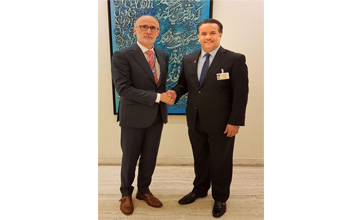ID :
461849
Sun, 09/17/2017 - 12:16
Auther :
Shortlink :
https://www.oananews.org//node/461849
The shortlink copeid
Bahrain values EU constructive cooperation on human rights

Geneva, Sep. 16 (BNA): Assistant Foreign Minister Abdullah bin Faisal bin Jabur Al Doseri, has affirmed that Bahrain is proceeding with the reinforcement of human rights as well as supporting preventive measures according to a modern approach and an advanced national strategy that stems from the reforms by His Majesty King Hamad bin Isa Al Khalifa.
This is also in line with the royal reform’s cultural and civilizational values and deep-seated democratic principles that promote human rights, basic freedoms, political participation, women empowerment, freedom of expression, opinion and right to assembly, with devotion to equity and rule of law, he added.
The Assistant Foreign Minister emphasized Bahrain’s intent to further underpin cooperation with the EU, uttering delight over on-going bilateral interaction and joint efforts to boost cooperation between the two sides.
Bahrain is looking forward to increasing the exchange of expertise and increase joint action and coordination for the sake of broader collaboration in all domains that pertain to human rights.
Al Doseri made the remarks as he met Chief of Permanent Mission of the Kingdom of Belgium to the United Nations Office and Specialized Institutions in Geneva, Geert Muylle, Chief of Permanent Mission of the Republic of Austria, Thomas Hajnoczi, and Chief of the Permanent Mission of the Republic of Slovenia, Vojislav Šuc.
The Assistant Foreign Minister highly valued EU enthusiasm for bilateral dialogue and constructive cooperation with Bahrain on human rights as indicated in the EU statement during the discussion of Article II on the agenda of the Human Rights Council in Geneva.
The meeting touched on the efforts being exerted to fight terrorism and its funding sources and discussed the negative effects of violence on security, peace and human rights.
Al Doseri gave a briefing on the causes behind the decision made by Bahrain, Saudi Arabia, the United Arab Emirates and Egypt to boycott Qatar.
He ascribed the causes to Qatar’s irresponsible stances and behavior, its support for terrorist and extremist groups, its interference in the domestic affairs of other states and harbouring terrorist groups that are on terrorism lists regionally and globally. He also attributed the boycott decision to Qatar’s adamant support for Arab countries’ antagonist states in a way that shook their security and stability and brought harm to the region as a whole.





